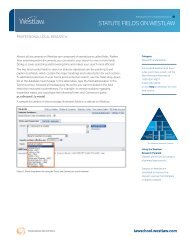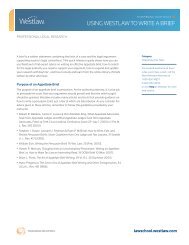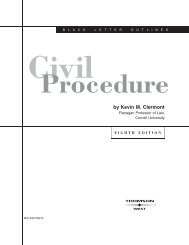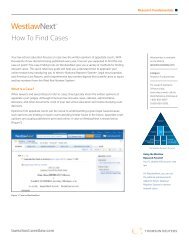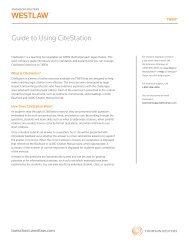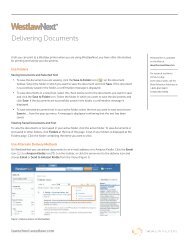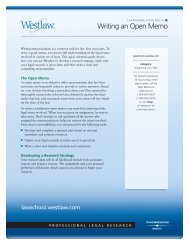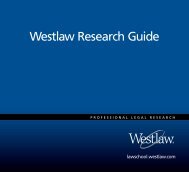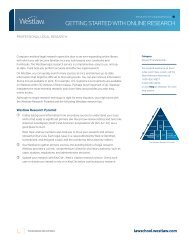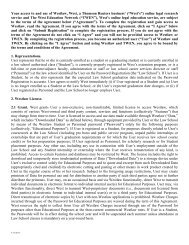WRITING AN OPEN MEMO - Westlaw
WRITING AN OPEN MEMO - Westlaw
WRITING AN OPEN MEMO - Westlaw
You also want an ePaper? Increase the reach of your titles
YUMPU automatically turns print PDFs into web optimized ePapers that Google loves.
Writing Your Memo<br />
Determining the Format<br />
At the time you receive the memo assignment, ask whether<br />
the person assigning it has a particular format or<br />
organizational scheme in mind. Also inquire as to where you<br />
can find samples of similar memos. One possible format is<br />
described below:*<br />
1. a caption identifying the author, recipient, date, and<br />
subject of the memo;<br />
2. a statement of the issue or question presented, including<br />
the relevant facts and legal rule;<br />
3. an answer or conclusion that states your assessment<br />
of a likely ruling on the question presented, with a<br />
short explanation;<br />
4. a statement of facts that sets out the legally relevant facts<br />
as well as important background information; and<br />
5. a discussion or analysis section that sets out a detailed<br />
analysis of the legal issue.<br />
*From Fay Rosenfeld, Summer Associates: How to Ace Those Writing<br />
Assignments, N.Y.L.J., June 4, 2001, s10, col. 1.<br />
Writing and Revising<br />
If you are having difficulty beginning the actual writing<br />
process, try any of the following methods to get started:<br />
■ Develop a detailed outline.<br />
■ Create a flow chart, visually presenting the flow of<br />
information.<br />
■ Start with the statement of facts or other point within the<br />
memo instead of with the first sentence.<br />
Allow yourself time to revise and edit your memo several<br />
times. In early drafts, just get your ideas on paper without<br />
focusing too much on format, then reorganize and refine<br />
your thoughts. Make sure you’ve stated the law and facts<br />
accurately and that your ideas are arranged logically. You<br />
may realize that you need to reorganize portions of your<br />
memo or conduct additional research.<br />
In later drafts, focus on grammar, punctuation, and spelling.<br />
Make sure your citations are in the proper format, whether<br />
you are following The Bluebook, the ALWD Citation<br />
Manual, or another source.<br />
Proofreading<br />
Do a final review for typographical and grammatical errors,<br />
using the following techniques:<br />
■ Read the material out loud. You often can hear mistakes<br />
that your eyes have missed.<br />
■ Ask a colleague to read your document. Do not rely on the<br />
spell-check feature on your computer, as it won’t find<br />
incorrect or missing words.<br />
■ Check margins, titles, and headings as well as font size,<br />
capitalization, and underlining.<br />
Helpful Writing Resources<br />
You can find many articles on <strong>Westlaw</strong> containing useful<br />
tips for writing open memos as well as other types of<br />
professional documents such as client letters and court briefs.<br />
A few of these articles are listed below. To retrieve them on<br />
<strong>Westlaw</strong>, type the citation listed after each article in the Find<br />
by citation text box in the left frame of the tabbed Law<br />
School page.<br />
Articles<br />
Donna E. Artz, Tips on Writing and Related Advice, 5<br />
Perspectives: Teaching Legal Res. & Writing 113 (1997).<br />
[5 perspec 113]<br />
John Bae and Jane Malmo, Be a Good Storyteller: Tips for<br />
Acing a Writing Assignment, 10/14/2002 Tex. Law. 31.<br />
[10/14/2002 tex law 31]<br />
Mark L. Evans, Tips for Writing Less Like a Lawyer, 7<br />
Scribes J. Legal Writing 147 (2000).<br />
[7 scribe 147]<br />
Bryan A. Garner, An Approach to Legal Style: Twenty Tips<br />
for the Legal Writer, 2 Scribes J. Legal Writing 1 (1991).<br />
[2 scribe 1]<br />
Kenneth F. Oettle, The Writing Process Begins with Getting<br />
the Assignment Straight, 171 N.J.L.J. 842 (2003).<br />
[171 njlj 842]<br />
Suzanne E. Rowe, Legal Research, Legal Writing, and Legal<br />
Analysis: Putting Law School into Practice, 29 Stetson L.<br />
Rev. 1193 (2000).<br />
[29 stetson l rev 1193]<br />
Books<br />
In addition to your own legal writing textbook, you may<br />
want to consult one or more of the following publications:<br />
Lynn Bahrych & Marjorie Dick Rombauer, Legal Writing in<br />
a Nutshell ®<br />
(3d ed. 2003).<br />
Martha Faulk & Irving M. Mehler, The Elements of Legal<br />
Writing: A Guide to the Principles of Writing Clear, Concise,<br />
and Persuasive Legal Documents (1996).<br />
Tom Goldstein & Jethro K. Lieberman, The Lawyer’s Guide<br />
to Writing Well (2d ed. 2002).<br />
Terri LeClercq, Expert Legal Writing (1995).<br />
Richard C. Wydick, Plain English for Lawyers (4th ed.<br />
1998).





